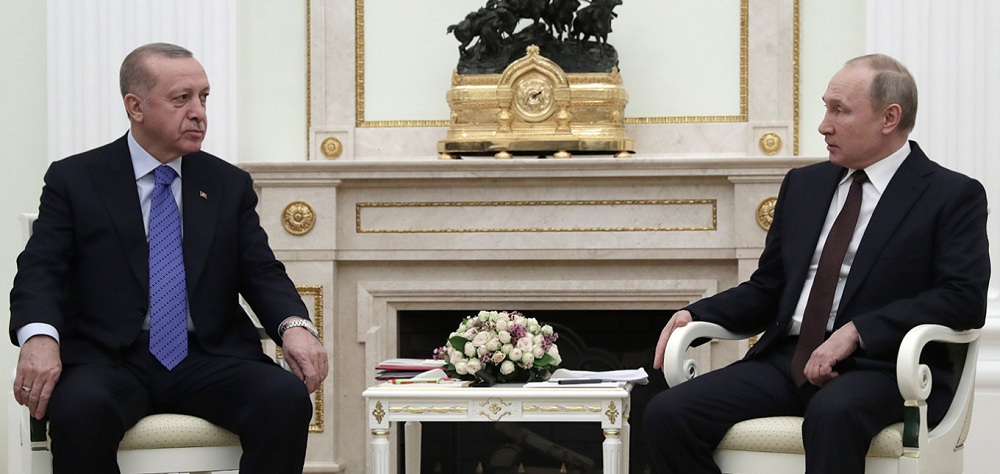Alwaght- Over the past few months, Syrian Idlib province crisis has been the hotbed of regional disputes bringing Russia and Turkey to the brink of direct military clashes as each of two actors supports the opposite side of the conflict in the Arab country.
After a period of intensified tensions in Idlib that saw the two powers nearly clashed, the Turkish President Recep Tayyip Erdogan traveled to Moscow and talked to his Russian counterpart Vladimir Putin and arranged a ceasefire between the two sides of the confrontation. Since then, the clashes majorly subsided and various sides began to suggest that Moscow and Ankara have reached a comprehensive deal to the cessation of fire in the contested Syrian city, which is the last shelter of the foreign-backed terrorists.
Over the past two weeks, Turkish and Russian forces conducted joint patrols in the Idlib de-escalation areas. In response, some Idlib-based militants, accusing Turkey of betraying them and cooperating with the Syrian government, have carried out attacks on the Turkish forces in the patrolling areas. The latest attack was launched on March 25 when the militia fighters targeted Turkish army’s two armored personnel carriers.
The attacks raise some questions: What do the militants in Idlib think about the peace deal in terms of the interests and consequences? Will they be committed to its terms and conditions?
Difference over swearing allegiance to Erdogan
An important issue regarding the approach of the militia groups to the Russian-Turkish Idlib truce is linked to their vision towards the allegiance to Turkey’s Erdogan as the caliph and leader. In the structure of Salafi-takfiri groups, allegiance to the caliph is of huge significance. In fact, they swear allegiance to a figure as a caliph and follow him as their political and spiritual leader.
Over the past few years, word spread that Salafi fighters, whose number is in tens of thousands with the most important of them fighting in the ranks of the Tahrir Al-Sham group, swore allegiance to Recep Tayyip Erdogan. Although Erdogan is a president of a secular country, he, having Muslim Brotherhood Islamic beliefs and ideology, to some extent accepted the caliphate doctrine and the role of a caliph. This role complies with his doctrine of reviving the Ottoman Empire that until early 20th century led the Sunni Muslim world with its center being Today's Turkey. Now Erdogan appears to intend to restore the position of a caliph as the position was held by his Ottoman predecessors under the title of “sultan”. Attracted by this strategy of Erdogan, some of the militant leaders in Idlib have sworn allegiance to him.
However, a vast portion of the body of militant groups cannot accept that Erdogan is their caliph. Some emirs in the Salafi groups reject accepting Erdogan as their “wali al-amr”, a Muslim word for leader, despite their senior members’ allegiance to him and that is because he has no charismatic personality as a mufti nor does he fully comply with their ideologies.
So, at least at the level of medial leaders, there is a conflict of views with the top militant leaders over the Turkish agreement with Russia. That is why they use any chance they get to foil the deal.
Ceasefire not recognizing militant groups’ existence
The Idlib-based terrorist groups do not consider the ceasefire deal as positive to their interests. The deal mainly seeks to prevent a devastating war between the Russian and Turkish forces operating across Idlib as it at the same time leans towards realizing the Moscow demand for the exit of the armored groups from the Syrian city.
Russia does not recognize as parties to the peace deal any of the armored groups labeled by the United Nations as terrorist groups. The Russian military leaders reserve the right to attack them whenever they get a chance no matter if Turkey wants to provide them military cover.
Although Turkey insists to give the armored groups a fake recognition and identity and incorporate them in the deal, they know very well that the agreement cannot guarantee their existence. So, they find it illogical to accept a deal that does not essentially offer them any immunity from the potential attacks either by the Syrian forces or their ally Russia.
The deal represents a chance for terrorists to reorganize and rejuvenate
While the deal of Erdogan and Putin is viewed negatively by the armored groups in Idlib, it can offer them the opportunity to rebuild their largely weakened power as they engaged in a weeks-long fight with the government forces and their allies who launched the final push to recapture the city from an array of foreign-supported terrorist groups coming not only from Syria but also recruited from a set of foreign countries.
Since 2016, the terrorists in Syria suffered huge defeats from the widely advancing Syrian troops who have the air cover of Russia. On southern fronts specifically, they sustained huge losses in their human and military resources. They also received a heavy loss in Aleppo, a strategic province in the northwestern part of the country, and now their only hope is keeping Idlib.
Over the past few months, Damascus forces launched an operation meant to finally take back Idlib and put an end to the terrorists' existence in the important province. Their attacks have been painful to the terrorists, leaving them without much breathing room. Stepped-up Russian airstrikes after Moscow lost its hope in Ankara to reign in the terrorist groups and rise in sight of a Russian-Turkish military confrontation added to the pressures on the anti-Damascus groups.
But now that a truce is in effect, they can view it as a chance to reorganize and rebuild their power and forces. Actually, this is the last chance they can take to reconstruct what they have lost of their power.



























